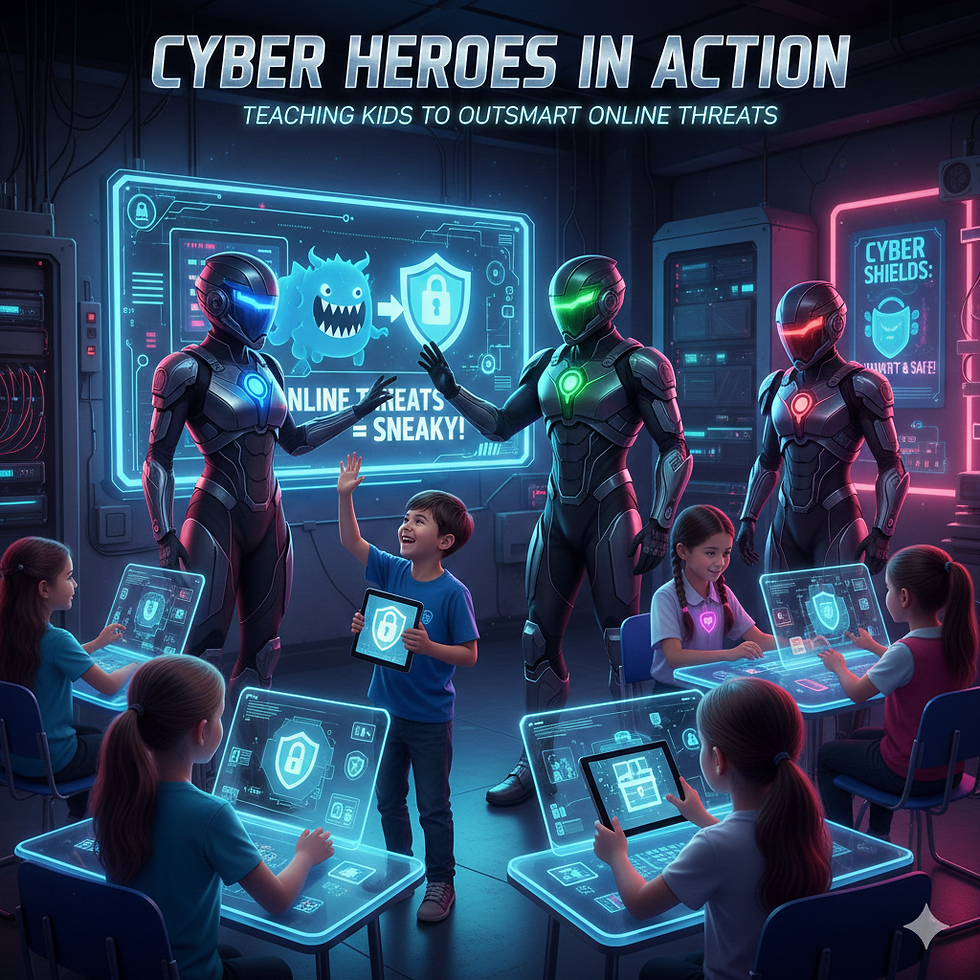Uncover the Top Secrets to Cultivating Digital Citizenship for Kids - Get in on the Excitement!
- Valarian Couch
- Apr 12, 2025
- 4 min read
In today's digital age, being a good citizen means more than just caring about your local community. It now extends to how we interact in the vast online world. As parents and educators, it is crucial to teach kids about digital citizenship. By focusing on online safety, respectful communication, and understanding their digital footprint, we not only empower them but also prepare them to become responsible adults in an increasingly tech-driven society.
Let’s explore exciting ways to help children cultivate digital citizenship!
What is Digital Citizenship?
Digital citizenship is about using technology responsibly and smartly to participate in the digital world. This concept includes online etiquette, cybersecurity, data privacy, and recognizing the long-term impact of their online actions. For kids, learning these skills is vital. It equips them to navigate online platforms safely and respectfully, enabling them to enjoy the digital experience while making responsible choices.
Why Is Digital Citizenship Important for Kids?
As kids engage with technology early on, they face different challenges and responsibilities. Understanding digital citizenship helps them in several ways:
Stay Safe Online: Kids need to learn about potential online dangers like cyberbullying, inappropriate content, and privacy risks. A survey found that nearly 60% of kids have experienced some form of online bullying.
Communicate Respectfully: Digital platforms can often lead to misunderstandings. Teaching kids how tone and context impact conversations can help prevent conflicts online. For instance, a text can easily be misinterpreted, which is why discussing tone is so important.
Understand Their Digital Footprint: Kids need to realize that everything they post online can affect their future. Studies show that about 70% of employers research potential candidates online. Educating them about this can lead to wiser decisions.
A solid foundation in digital citizenship promotes proactive, positive online interactions that can last a lifetime.
Engage Kids with Fun Learning Activities
Learning about digital citizenship can be entertaining! Here are engaging activities to help kids grasp vital lessons:
Digital Citizenship Games
Countless interactive online games focus on digital ethics and cybersecurity. For instance, websites like Common Sense Education offer game-based learning experiences that are both fun and educational, helping kids understand digital responsibilities.
Role Play Scenarios
Arrange scenarios where kids must decide how to react in various online situations. For example, they might face a cyberbully or navigate a tricky conversation with a peer. Role-playing allows kids to practice their responses, enhancing their ability to handle real-life situations.
Create a Digital Citizenship Classroom
Transform a space into a "Digital Citizenship Zone." Decorate it with guidelines for online behavior, encourage open discussions, and use it for activities aimed at navigating the digital world effectively.
Discuss the Importance of Privacy
Privacy is critical in our digital interactions. Here’s how to ensure children recognize its importance:
Teach Strong Passwords: Guide kids on creating strong passwords and emphasize the importance of keeping them confidential. Studies reveal that about 81% of data breaches result from weak passwords.
Review Social Media Settings Together: If kids are using social platforms, sit down with them to go through privacy settings. Make sure they understand who can view their content. Research indicates that 60% of teens don’t adjust their privacy settings on social media.
Share Real-World Examples: Provide relatable scenarios where personal information should remain private. Explain why certain details and pictures should be kept off the internet.
Teach Critical Thinking Skills
In a world overflowing with information, teaching kids to evaluate sources is essential:
Encourage Fact-Checking: Promote habits where kids verify online information. This includes checking multiple sources before accepting something as true. A recent study found that only 24% of teens verify news sources.
Recognize Biases: Discuss how some websites may present information from a particular viewpoint. Helping kids recognize biases will prepare them to engage with content in a thoughtful manner.
Analyze Digital Media: Use news articles and social media posts to ask questions that encourage critical thinking. For instance, ask them how a headline could influence someone’s opinion.
Foster Positive Communication
Digital exchanges often lack the personal touch, leading to misunderstandings. Consider this to enhance positive communication skills:
Explain Tone and Context: Show kids how word choice and tone change their intended message. Classroom discussions on examples can help deepen their understanding.
Encourage Empathy Online: Help children realize how their words can impact others. Simple exercises where they reflect on their online actions can nurture empathy.
Promote Kindness: Encourage small acts of kindness, such as complimenting or supporting peers online, creating a positive digital environment. Research shows that positive interactions online can improve mental health.
Model Good Digital Citizenship
Kids learn best by example. Here’s how to practice good digital citizenship yourself:
Share Your Online Experiences: Let kids in on your online decisions, such as how you manage your privacy or communicate with others digitally.
Limit Your Screen Time: Demonstrate the importance of balance by modeling healthy screen time. Studies suggest that setting a good example can encourage kids to develop better habits.
Participate in Online Activities Together: Engage in online experiences with children, like playing educational games. This fosters open discussions about digital behavior.
Monitor and Guide Their Online Activity
It’s crucial to monitor your child's online activities while fostering independence. Here are a few strategies:
Regular Check-Ins: Make it part of your routine to discuss what they do online, who they interact with, and their thoughts on their experiences.
Use Parental Controls Cautiously: While utilizing parental control tools, explain why these measures are in place to help protect them. A study found that 70% of kids feel their parents should involve them in discussions about internet safety.
Encourage Safe Exploration: Create opportunities for your children to explore the internet safely. Guide them through reputable sites and resources, discussing why certain content is safer than others.

Embrace the Digital Future Together
Cultivating digital citizenship in kids is an ongoing journey full of excitement, learning, and growth. By involving them in fun activities, enhancing their communication skills, and guiding their online interactions, you equip them with the tools needed for responsible online behavior.
As they navigate the digital world, instilling these values today will help shape them into thoughtful digital citizens tomorrow. So, let the journey begin! Embrace these secrets and get excited about nurturing responsible, respectful, and skilled digital citizens for the future!
.jpg)




Comments